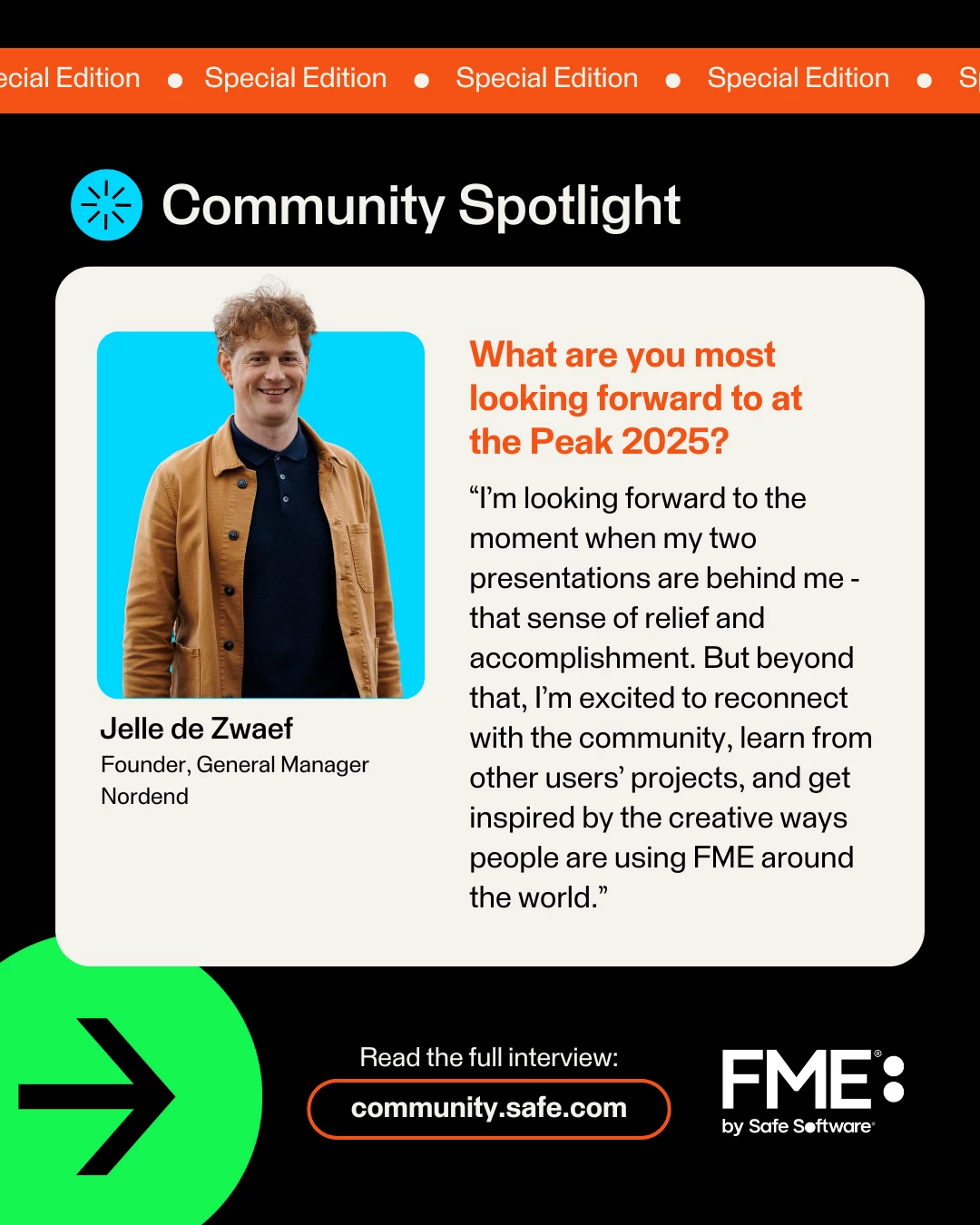Welcome to our May FME Community User Spotlight! Every month, we’ll be spotlighting a user in the community whose active participation and helpful contributions have been invaluable to the community. We’re excited to highlight their experiences and insights!
In anticipation of the Peak of Data & AI 2025 coming up on May 6-8, we’ll be featuring speakers from the Peak over the next three months in our spotlights.
User Spotlight: Jelle De Zwaef @jelle
What company do you currently work for?
Nordend
What’s your current job role and title?
Founder, General Manager
Tell us more about what you do and how you use FME?
I work as a data and process consultant with a strong focus on spatial information. FME is my platform of choice to bring structure to complex data, automate repetitive tasks, and design clear, reliable workflows.
I often work at the intersection of technical teams and decision-makers. FME helps me translate between those worlds by making data tangible and workflows transparent. Whether I'm supporting a government agency, a utility company, or a software integrator, I use FME not just to process data but to model thinking - so that what we build is maintainable, collaborative, and aligned with the bigger picture.
Why did you join the FME Community?
I joined the FME Community to get answers to technical questions. I was curious how quickly people would respond - and I was impressed. Over time, I noticed that most of my questions had already been asked and answered, which made the community an even more valuable resource.
I still search the forums regularly, and I appreciate how open and generous people are with sharing their knowledge. It’s one of the few technical communities where both beginners and advanced users genuinely help each other move forward.
What are you speaking about at the Peak of Data & AI 2025?
- Integrating Legacy and OTL Data for Enhanced Asset Management
This talk explores how FME is used to integrate legacy asset data with a new Object Type Library (OTL) at the Agency for Roads and Traffic in Flanders. The project focuses on consolidating overlapping datasets, visualizing differences, and updating the central database through a structured, repeatable FME process - enabling better asset management and data quality.
- Improving Cycling Safety in East-Flanders with Mobile Mapping and FME
In this session, I present how mobile mapping, image recognition, and FME workflows were used to enhance the safety and consistency of a cycling network. By linking traffic signs to road segments and analyzing access rules, speed zones, and priorities, the project supports smarter infrastructure decisions and a safer cycling experience.
Why do you think an FME user should attend the Peak 2025?
Peak of Data Integration and AI 2025 is the best place to learn how others are using FME to solve real-world problems - across industries, scales, and continents. You get practical insights you won’t find in the documentation, direct access to experts, and the chance to connect with a global community that’s as generous as it is skilled. Whether you're just starting out or deep into complex workflows, you’ll leave with new ideas, sharper skills, and a renewed sense of what’s possible with FME.
If you’ve been to a past user conference hosted by Safe, what’s one of your favourite memories from it?
One of my favourite memories is finally meeting the people behind the FME Community in person. It’s striking how open and collaborative the atmosphere is - everyone is genuinely curious, willing to share, and focused on making the platform even better together. It really felt like stepping into a space where problem-solving and innovation go hand in hand.
What are you most looking forward to at the Peak 2025?
Honestly, I’m looking forward to the moment when my two presentations are behind me - that sense of relief and accomplishment. But beyond that, I’m excited to reconnect with the community, learn from other users’ projects, and get inspired by the creative ways people are using FME around the world.
If you were stranded on an island and could only bring three things with you, what would they be?
A solar-powered GPS (because I’d want to know exactly where I’m stranded), a blank field notebook (so I can start mapping the island myself), and an FME license - because if I’m stuck, I might as well automate the coconut inventory and track crab migration patterns.






